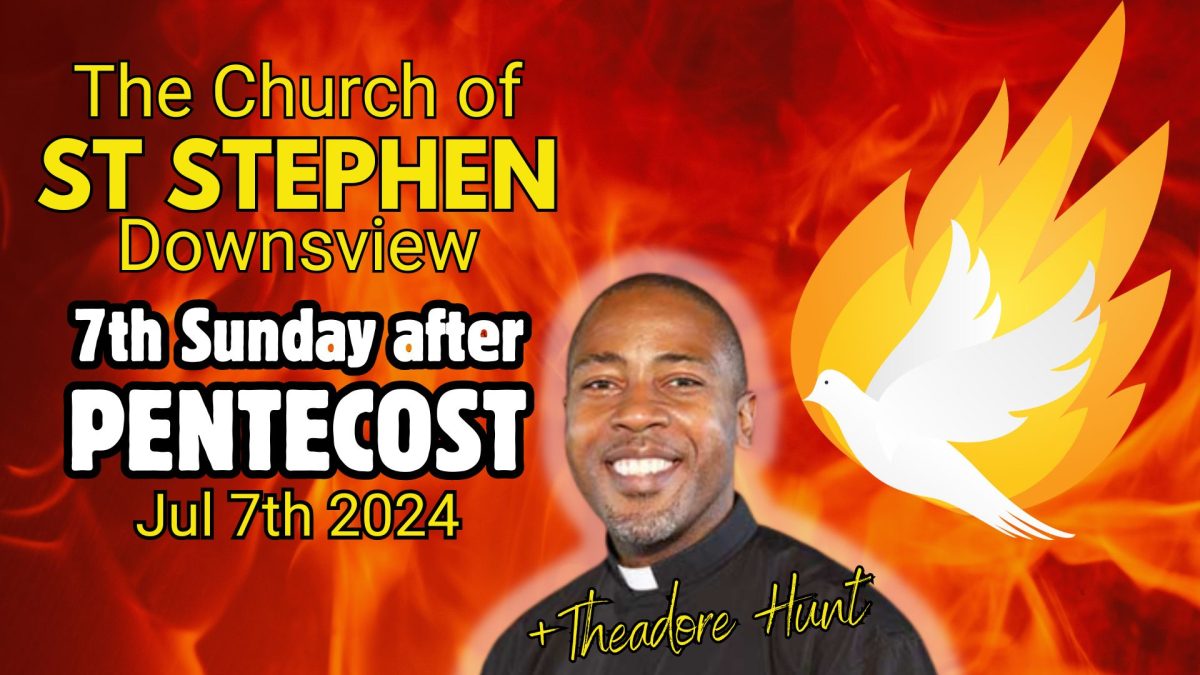Archive for July, 2024
Posted on: July 28th, 2024 by St. Stephens Downsview
 When I walk into a place filled with familiar faces and friends, I feel an overwhelming sense of peace. That’s exactly how I feel whenever I come here, surrounded by all of you. I’m grateful to spend two more Sundays with you, so there’s no need to be afraid.
When I walk into a place filled with familiar faces and friends, I feel an overwhelming sense of peace. That’s exactly how I feel whenever I come here, surrounded by all of you. I’m grateful to spend two more Sundays with you, so there’s no need to be afraid.
The Lessons from David’s Story
Today, we reflect on a strange yet profound story from the Old Testament about King David. David, a man after God’s own heart, succumbed to grievous sin by taking a soldier’s wife and then orchestrating the soldier’s death through a letter to the commander. It’s a shocking tale, yet it is a testament to human fallibility and divine forgiveness.
David’s actions were exposed when Prophet Nathan confronted him. Nathan told David that if he needed more wives, God would have provided them. Yet, David’s greed and misuse of power led him astray. Despite his numerous wives and concubines, he wanted more, which only highlights human nature’s inclination towards dissatisfaction.
Upon realizing his mistakes, David repented profoundly. Psalm 51, attributed to his repentance, reminds us that no one is righteous; we have all committed sins. David’s story prompts us to look around and acknowledge that corruption isn’t confined to our leaders—it exists within us all. Are we, like David, willing to confront our own faults and seek God’s forgiveness?
God’s Sufficiency for All Our Needs
Today’s readings, particularly from the Gospel of John, center on God’s all-sufficiency. Unlike us, God is self-sufficient, needing nothing. As His creation, however, we are perpetually in need. Psalm 23 reassures us with these words: “The Lord is my shepherd; I shall not want.” But let’s not misinterpret that. Being human, we will always have needs, whether small or great.
Matthew 7:7 resonates with the concept of seeking and finding, asking, and receiving. It’s all about recognizing our needs and seeking God’s provision.
People followed Jesus for various reasons: some sought miracles, others sought healing, and some were even hoping for material blessings. They were fascinated by His acts, with many questions on their minds: Is He the Messiah? Can He help me? Would He make us win the lottery if He were here today?
Imagine winning a million-dollar jackpot. It seems like a dream, but God provides us with more than we can ask or imagine. Jesus cares about our needs, evidenced by His miraculous provision of manna in the wilderness and water for the thirsty Israelites. Glory be to God, whose power, working in us, can do infinitely more than we can ask or imagine.
The Miracle of Provision
The story of Jesus feeding the 5,000 with five loaves and two fish is a testament to His boundless provision. The small boy who offered his humble meal exemplifies faith and generosity. Despite the vast crowd, Jesus took what was given, blessed it, and ensured everyone was satisfied, even gathering leftovers. Isn’t God wonderful?
God doesn’t work in isolation. He uses people like us to accomplish His purposes. How did it happen that only one small boy had food among thousands? That’s a mystery. Yet, through that small offering, Jesus performed a miracle.
God’s Wonder in Daily Life
Consider this: take your child to a picnic and offer them an ice cream, then stretch out your hand and ask for a bite back. Watch their reaction—it’s often one of reluctance. Yet, the boy gave up his bread and fish willingly. God works in mysterious ways, using ordinary people for extraordinary purposes.
Let me share a story of a very wealthy man whose daughter’s wedding gown tore on her special day. Despite his wealth, he didn’t have a simple needle and thread to fix it. A poor old lady, however, came forward with a needle and thread, saving the day. This incident underscores that we all have needs beyond material wealth. Sometimes, it’s the simplest things that make the biggest difference.
God’s Abundant Love and Provision
My dear brothers and sisters in Christ, recognize that God is always ready to give us more than we can ask or imagine. It’s His abundant provision that allows us to share with others who are in need. We are all in this cycle of giving and receiving, under the glorious provision of God.
In the Name of God, the Father, God, the Son, God, the Holy Spirit. Amen.
Posted on: July 21st, 2024 by St. Stephens Downsview

Greetings, dear readers.
It is wonderful to connect with all of you today. On this 9th Sunday after Pentecost, I have some reflections to share from the letter of Paul to the Ephesians. Specifically, I want to delve into Ephesians chapter 2, verses 13 to 14:
“To the Gentiles, Paul writes, remember that you were at that time without Christ, being aliens from the commonwealth of Israel and strangers to the covenants of promise, having no hope and without God in the world. But now, writes Paul, in Christ Jesus, you who were once far off have been brought near by the blood of Christ.”
Paul’s words, “You who were once far off have been brought near by the blood of Christ,” resonate deeply as they encapsulate the transformative power of Christ’s love.
The Power of Perspective
At home, my daughters love to play with an old cell phone. They make videos, take pictures, and even edit funny features into their creations. Recently, they attached the phone to a remote control vehicle and cast the image to a TV in another room, using it as a spy cam. They even claimed to know all the ingredients of a smoothie I was making!
What stands out for me is how sometimes they zoom in so closely on a picture that it becomes difficult to identify what it is. This playful “zooming in” mirrors the way we often view our lives, focusing intently on our immediate concerns and missing the larger picture.
Lessons from Bible Study
This past Thursday evening at Bible study, we concluded our study of the book of Daniel. This study was meant to prepare those going to see a live production of Daniel in Lancaster. Throughout our study, we were reminded again and again of the reality of God’s providence, or God’s protective care and control over all creation, our lives included.
God’s providence can be easy to miss when we focus too narrowly on our own immediate situations. When we zoom in too closely, we might question if God is aware of our personal struggles and circumstances.
Zooming Out with the Book of Daniel
The book of Daniel helps us to zoom out and see God’s hand at work not just in Daniel’s immediate circumstances under Babylonian exile, but across centuries. God was always at work, even amidst the evil powers of other kingdoms, drawing people toward His ultimate plan.
David’s Vision Expanded
Today’s scripture from the Old Testament recounts David’s desire to build a temple for the Ark of the Covenant. However, God, through the prophet Nathan, redefined David’s vision by declaring that He, the Lord, would make David a house—a dynasty, culminating in the eternal reign of Christ from David’s line. This required David to zoom out and see God’s greater plan beyond his own immediate desires.
Jesus’s Compassionate Call
In today’s Gospel reading from Mark, we find Jesus inviting His disciples to rest after returning from their missions. Despite their excitement and the constant demands from people, this was also an invitation to zoom out and reflect on the bigger picture of their ministry.
When Jesus saw the crowd as sheep without a shepherd, He was moved with compassion. His healing and teaching were previews of His promise in John 12:32: “And I, when I am lifted up from the earth, will draw all people to myself.” This illustrates His working to draw all creation unto Himself, emphasizing a broader divine vision.
Contemporary Divisions and Unity in Christ
Our world today is fraught with divisions—race, ethnicity, gender, socioeconomic status, political affiliations, even beliefs about masks and vaccines. When we let these divisions dictate our relationships, we miss out on the profound unity we have in Christ.
Paul’s message to the Ephesians challenges us to recognize that, despite differences, we are all reconciled to the one true God through Jesus Christ. Through faith, we become fellow citizens in God’s household, transcending our divisions.
Personal Reflection: Where Are You?
So, I invite you to reflect: Where are you in this world today? What personal battles are you facing? Are you like David, perhaps comfortable and forgetting your dependence on God? Or are you like the excited disciples, missing the point of God’s work through you? Or maybe like the Ephesians, focusing on what separates rather than unites us?
The Bigger Picture
Remember that God’s view is both from a distance and intimately close. His providence is ever-active, and though we may struggle to see the larger picture, God is drawing us toward His purposes. My prayer for us today is simple: May God grant us the grace to see His hand at work in our lives, to find faith and courage in His guidance, and to remain faithful in following His divine direction.
Thank you for reading, and may you find peace and clarity in embracing the bigger picture of God’s providence in your life.
Amen
Posted on: July 14th, 2024 by St. Stephens Downsview
by Peter Owadayo

Sometimes God physically touches His people, and in those moments, you can feel His presence in an indescribable way—what I like to call “Holy Ghost goosebumps.” There might be heat, tingling, or other sensations that reveal His glorious presence among us. This morning, I want to take you on a journey of surrendering yourself under God’s control, drawing inspiration from Moses’ plea in Exodus chapter 33, “Lord, please show me your glory.”
**Surrendering to God’s Control**
Today, we are going to explore how we can witness God’s glory by releasing our spirit under the Holy Spirit’s control. Just as Moses did, we will see His glory if we let go and surrender to Him fully. It’s through surrender that we can truly experience the enduring mercy and might of the Lord, our omnipotent Father
.
**Welcoming the Holy Spirit**
I invite you to welcome the Holy Spirit into your life and your space. Sing with me if you know the words:
“Holy Spirit, thou art welcome in this place.
Holy Spirit, thou art welcome in this place.
Omnipotent Father of mercy and grace, thou art welcome in this place.”
**Prayer for Healing and Restoration**
Lord Jesus Christ, you are the great physician. This morning, we ask for your presence to move among us. Heal every infirmity, restore lives, mend broken relationships, and bring joy into our homes. Provide strength to our seniors and open doors of opportunity for your people.
**Living a Joyful Life in God**
God has called us to live a joyful and victorious life in Him. There is no specific formula for a faith-filled life, but He has given us ways to strengthen our faith daily. Through prayer, reading, and meditating on His word, and serving others, we can grow closer to Him.
**God at the Center**
When we make God the center of our lives, every situation and circumstance will follow His divine will. Just like in the house of Obed-Edom, where everything fell into place because they recognized and honored the presence of God, we too can experience His blessings when we keep Him at the heart of our lives.
**Recognizing God’s Presence**
The Ark of the Covenant, a symbol of God’s supreme power and presence, contained the laws that guided His people. When the Ark was taken away, the Israelites strayed from God’s commandments. However, King David’s act of bringing the neglected Ark back to his new capital demonstrated the importance of returning to God and recognizing His presence in our lives.
Sometimes we may act out of our own foolishness, like Lot’s wife, who turned back and became a pillar of salt. But when we recognize God’s presence and move forward in faith, we embrace His joy and blessings.
**Obedience and Blessings**
When we obey God’s word, we open ourselves to His blessings. David and the Israelites rejoiced at the triumphant return of the Ark, which symbolized the presence of God among them. Similarly, Jesus Christ is our Ark, the manifestation of God’s favor, and through Him, our prayers and praises are accepted.
**A Call to Put God First**
Beloved, when we put God first in our lives, our homes, and our work, we will see His glory revealed. Just as Obed-Edom was blessed for valuing God’s presence, we too can attract blessings by making God the center. Our lives should be an open book that mirrors God’s love and grace to our community.
**Conclusion**
In our journey, let’s allow God to be paramount. Trust in Him for solutions, and let’s ensure His commandments guide our decisions. As we pray:
“Eternal God, move in our individual lives. As we journey in this race, Holy Spirit, we need your intervention, especially in these end times. Help us live our lives carefully, with you at the center.”
Amen.
Posted on: July 7th, 2024 by St. Stephens Downsview
 Some words from Mark’s Gospel, chapter 6, reading from verse 7 to 9, have been resonating with me deeply. In these verses, we hear that Jesus called the twelve and began to send them out two by two and gave them authority over the unclean spirits. He ordered them to take nothing for their journey except a staff: no bread, no bag, no money in their belts, but to wear sandals and not to put on two tunics.
Some words from Mark’s Gospel, chapter 6, reading from verse 7 to 9, have been resonating with me deeply. In these verses, we hear that Jesus called the twelve and began to send them out two by two and gave them authority over the unclean spirits. He ordered them to take nothing for their journey except a staff: no bread, no bag, no money in their belts, but to wear sandals and not to put on two tunics.
As we’ve journeyed with Jesus over these past few Sundays through the lens of Mark’s gospel, I’ve come to see that Mark offers us glimpses of faith—faith as it is oriented toward Jesus as both its source and object. This faith revolves around his power at work in the lives of those he encountered.
Faith in Action
In Jesus’s earthly ministry, he traveled around teaching and proclaiming the gospel of the kingdom of God, healing many who were brought to him in various conditions needing healing. By doing so, he kindled the faith of those around him and invited them to ponder who he was—one who could teach with such power and authority.
When Jesus stilled the storm in the company of his disciples, their faith was once again stoked, prompting them to ask, “Who then is this that even the wind and the sea obey him?” This question echoes through the narratives we’ve explored, from the faith of Jairus and his healed daughter to the unnamed woman whose faith led her to touch Jesus’s clothing for healing.
Faith in Jesus’s Hometown
Today, Mark contrasts two examples of faith: the faith, or lack thereof, in Jesus’s hometown of Nazareth and the faith of the twelve disciples whom Jesus sent out. Upon returning to Nazareth with his disciples, Jesus taught among those who had known him since childhood. While they recognized the wisdom in his teachings and witnessed great deeds of power, their familiarity bred contempt. They could not reconcile the man they knew with the authority he displayed, and thus their unbelief hindered Jesus’s work among them.
The Warning of Prejudices
This passage serves as a caution about how our prejudices and preconceived notions can limit our understanding and experience of God’s work. When we pigeonhole God, viewing Jesus merely as an interesting historical figure, an excellent teacher, or a great prophet, we miss out on recognizing him as our Lord and God.
The Disciples’ Example
In stark contrast to the unbelief in Nazareth is the faith of the disciples. Jesus gave them authority over unclean spirits and sent them out with nothing but the clothes on their backs to proclaim the message of repentance, cast out demons, and heal the sick. This sends a profound message about trust and dependence on God. Like the disciples, we are called to lean not on our own strength but on God’s provision and guidance.
Our Role as Modern Disciples
As modern-day followers of Jesus, we stand on the shoulders of these early disciples, called to continue their mission. We are sent out not with our own authority, but with God’s. It’s not our efforts that sustain us; it’s God who equips and supports us. As a church, reflecting on the seventy years past and the years ahead, we may doubt our strength, but it is God who supplies what we need for the journey.
Dependence on God
True faith often becomes evident in times of lack. When we have nothing else to lean on, we recognize our deep dependence on God. Too much abundance can lead to self-reliance, but in moments of bare necessity, God’s sustaining power becomes clear. Blessed are those who know their need of God, for theirs is the kingdom of heaven.
Concluding Thoughts
The two contrasting examples of faith in Mark’s Gospel—unbelief in Nazareth and the disciples’ faith—remind us that Jesus’s presence demands a response. We will either embrace faith or turn away in disbelief. Let us choose to be like the disciples, welcoming Jesus into our lives and relying on his power.
In doing so, our very lives become conduits for God’s work, living prophetically to invite others to encounter the same Jesus we have. Beyond what we think we know about Jesus, I pray that we all have a fresh encounter with him today, recognizing him not just as a historical figure or great teacher, but as the Lord and God of our lives and of all creation.
My prayer is that we would respond obediently to his call and serve him faithfully throughout our lives.
 When I walk into a place filled with familiar faces and friends, I feel an overwhelming sense of peace. That’s exactly how I feel whenever I come here, surrounded by all of you. I’m grateful to spend two more Sundays with you, so there’s no need to be afraid.
When I walk into a place filled with familiar faces and friends, I feel an overwhelming sense of peace. That’s exactly how I feel whenever I come here, surrounded by all of you. I’m grateful to spend two more Sundays with you, so there’s no need to be afraid.


